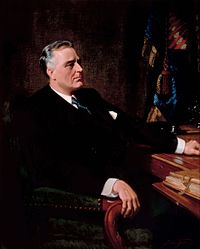
Before, during and after his presidential terms and continuing today, there has been criticism of Franklin D. Roosevelt (1882–1945). His critics have questioned not only his policies and positions, but also accused him of trying to centralize power in his own hands by controlling both the government and the Democratic Party. Many denounced his breaking of a long-standing tradition by running for a third term in 1940.[1]
By the middle of his second term, much criticism of Roosevelt centered on fears that he was heading toward a dictatorship by attempting to seize control of the Supreme Court in the court-packing incident of 1937, attempting to eliminate dissent within the Democratic Party in the South during the 1938 mid-term elections and by breaking the tradition established by George Washington of not seeking a third term when he again ran for re-election in 1940. As two historians explain: "In 1940, with the two-term issue as a weapon, anti-New Dealers [...] argued that the time had come to disarm the 'dictator' and to dismantle the machinery".[2]
Long after Roosevelt's death, new lines of attack opened to criticize his policies regarding helping the Jews of Europe,[3] incarcerating Japanese Americans on the West Coast in concentration camps,[4] and opposing anti-lynching legislation.[5]
- ^ George Wolfskill and John Allen Hudson. All But the People: Franklin D. Roosevelt and His Critics, 1933–39 (1969). Macmillan.
- ^ Herbert S. Parmet and Marie B. Hecht. Never Again: A President Runs for a Third Term (1968). p. 10.
- ^ Richard Breitman and Allan J. Lichtman. FDR and the Jews (2013).
- ^ Greg Robinson. A Tragedy of Democracy: Japanese Confinement in North America (2009).
- ^ Ira Katznelson. Fear Itself: The New Deal and the Origins of Our Time (2014).
